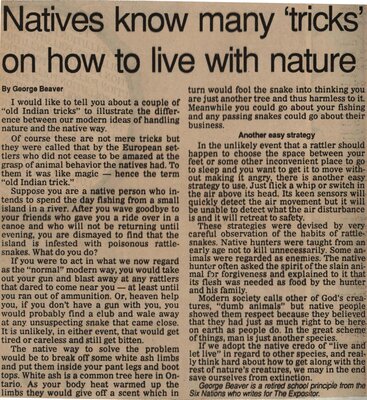"Natives Know Many 'Tricks' on How to Live with Nature
- Publication
- Brantford Expositor, Fall 1990
- Full Text
- Natives know many 'tricks' on how to live with natureBy George Beaver
I would like to tell you about a couple of "old Indian tricks" to illustrate the difference between our modem ideas of handling nature and the native way.
Of course these are not mere tricks but they were called that by the European settlers who did not cease to be amazed at the grasp of animal behavior the natives had. To them it was like magic - hence the term "old Indian trick."
Suppose you are a native person who intends to spend the day fishing from a small island in a river. After you wave goodbye to your friends who gave you a ride over in a canoe and who will not be returning until evening, you are dismayed to find that the island is infested with poisonous rattle-snakes. What do you do?
If you were to act in what we now regard as the "normal" modern way, you would take out your gun and blast away at any rattlers that dared to come near you - at least until you ran out of ammunition. Or, heaven help you, if you don't have a gun with you, you would probably find a club and wale away at any unsuspecting snake that came close. It is unlikely, in either event, that would get tired or careless and still get bitten.
The native way to solve the problem would be to break off some white ash limbs and put them inside your pant legs and boot tops. White ash is a common tree here in Ontario. As your body heat warmed up the limbs the would give off a scent which in turn would fool the snake into thinking you are just another tree and thus harmless to it Meanwhile you could go about your fishing and any passing snakes could go about their business.
Another easy strategyIn the unlikely event that a rattler should happen to choose the space between your feet or some other inconvenient place to go to sleep and you want to get it to move without making it angry, there is another easy strategy to use. Just flick a whip or switch in the air above its head, Its keen sensors will quickly detect the air movement but it will be unable to detect what the air disturbance is and it will retreat to safety.
These strategies were devised by very careful observation of the habits of rattle-snakes. Native hunters were taught from an early age not to kill unnecessarily. Some animals were regarded as enemies. The native hunter often asked the spirit of the slain animal for forgiveness and explained to it that its flesh was needed as food by the hunter and his family.
Modern society calls other of God's creatures, "dumb animals" but native people showed them respect because they believed that they had just as much right to be here on· earth as people do. In the great scheme of things, man is just another species.
If we adopt the native credo of "live and let live" in regard to other species, and really think hard about how to get along with the rest of nature's creatures, we may in the end save ourselves from extinction.
George Beaver is a retired school principle from the Six Nations who writes for The Expositor.
- Creator
- Beaver, George, Author
- Media Type
- Newspaper
- Item Types
- Articles
- Clippings
- Description
- "I would like to tell you about a couple of "old Indian tricks" to illustrate the difference between our modern ideas of handling nature and the native way."
- Date of Original
- Fall 1990
- Subject(s)
- Local identifier
- SNPL002772v00d
- Collection
- Scrapbook #2
- Language of Item
- English
- Geographic Coverage
-
-
Ontario, Canada
Latitude: 43.06681 Longitude: -80.11635 -
Ontario, Canada
Latitude: 43.06681 Longitude: -80.11635
-
- Creative Commons licence
 [more details]
[more details]- Copyright Statement
- Public domain: Copyright has expired according to Canadian law. No restrictions on use.
- Copyright Date
- 1990
- Copyright Holder
- Brantford Expositor
- Contact
- Six Nations Public LibraryEmail:info@snpl.ca
Website:
Agency street/mail address:1679 Chiefswood Rd
PO Box 149
Ohsweken, ON N0A 1M0
519-445-2954



